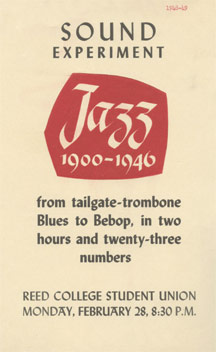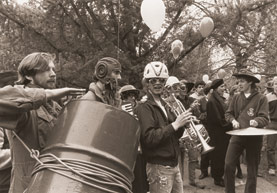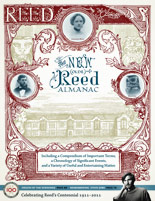
IRIS login | Reed College home Volume 90, No. 4: December 2011
The New (Olde) Reed Almanac (continued)
Scott Tissues: Maggie Scott ’19 [registrar 1923–62] was notorious for curt notices alerting students to their paperwork deficiencies. These missives became known as Scott Tissues, as revealed in this bit of doggerel:
My name is Margaret Scott.
I’m a keeper of records and rot.
If you’re making an issue
I’ll give you Scott’s tissue
That’s not worth a tittle or jot.
Scrounging: The tragedy of the commons.
Seventies, The: Charles Svitavsky [English 1961–98] once reflected on the campus mood of this turbulent decade. “In the ’60s, when I walked into class in the morning and said, ‘Good morning,’ the students wrote it down. When I walked in and said ‘good morning’ in the ’70s, students would say, ‘Oh, I don’t know about that, it doesn’t seem that good to me.’”
Shelley by Moonlight: After World War II, the GI Bill helped many veterans go to college, including Tom Kelly ’48. One night, while waiting for a bus on Woodstock Boulevard, Tom stood under a streetlight reading a book of poems by Percy Bysshe Shelley. Passing police officers stopped, found his reaction to their questioning suspicious, and hauled him down to the station. The following night, 100 students gathered at the bus stop to read poems in protest, making national headlines.
如果
Sociology: A science whose practitioners take commonsense propositions, translate them into impenetrable argot, perform strange experiments, and draw far-reaching conclusions that no one else understands. Intriguing courses have included Theories and Problems of Social Ethics; Neighborhood Progress; Economic, Social, and Political Problems of the Northwest; Ethnic Minorities; Technology and Society; and The Collapse of Communism. Influential profs (q.v.) have included William Ogburn [1912–17], Alexander Goldenweiser [1933–39], Howard Jolly [1949–70], John Pock [1955–98], William Tudor [1973–2009], Alexandra Hrycak [1998–], and Marc Schneiberg [2000–].

Sound experiments: First launched by professor Herb Gladstone [music 1947–80], the monthly performances took place in the old student union before a blazing fireplace. Innovation was the watchword. The very first was billed as “Jazz from tailgate-trombone Blues to Bebop, in two hours and twenty-three numbers.”
Spanish: The language and culture of the greatest civilization ever known. First offered at Reed in 1912, Spanish was taught both as language and as literature, but disappeared from the curriculum after 10 years. It staged a valiant comeback in the 40s, when five classes were listed, but vanished again after another decade. Restarted in 1967, Spanish has gained ground ever since. Intriguing courses have included Chicano Literature and Popular Culture; The Epics of the Conquistadors; Borges, Vallejo, Lezama, and the Limits of Expression; Chronicling America; Crime and Detection; Sexual Imagery from Medieval Manuscript to the Printed Text; and Realism and Magic. Influential profs (q.v.) have included Benjamin Woodbridge [1922–52], Angela Ayres [1966-73], Robert Johnston [1977–86], Sharon Larisch [1986–], Lourdes de León [1987–97], Libby Drumm [1995–], Katharine Jenkes [1997–2004], Diego Alonso [2001–], and Ariadna García-Bryce [2001–].
Sp
圣
Steam tunnels: Network of subterranean passages emanating from the massive central boiler in the physical plant, designed to transfer steam heat to campus buildings. Spelunking in them has been a popular Reed hobby from the founding. Betty Hines Holzer ’29 recalled picnicking with friends in the “Dutch ovens.” Steve Yeadon [facilities 2006–] points to two remarkable features: the montage of graffiti done by students over the years and the footprints in the cement floor—evidence of the workers who set the forms and poured the concrete in this first campus infrastructure. All tunnel openings are locked, but students still manage to find a way in, as fresh examples of graffiti attest. Rumor holds that a considerable number of garden gnomes have also found their way in over the years.
Student-faculty ratio: For most of its history, the college’s ratio hovered around 10–1. In the early 70s, facing a financial crisis, the faculty raised the figure to 12–1. This lasted until 1999, when President Steven Koblik led a campaign to add more professors and get the ratio back to 10–1. That effort, combined with support from Reed’s centennial campaign, has driven the current ratio down to 10.2–1.
Sullivan, Richard [prez 1956–67]: During his 11-year tenure—unusually long by Reed standards—Sullivan was able to do what many presidents could not: expand. A Harvard graduate and World War II veteran, Sullivan hiked faculty salaries, hired new professors, and implemented (for the first time) a sabbatical program. This helped make Reed a national institution and bolstered its reputation. Sullivan oversaw the construction of several buildings, including new biology and physics labs, residence halls, a sports center, the commons, bookstore, and a library addition. He also tried to establish a grad school (“Reed U”), which ultimately went nowhere. After Reed, he became president of the Association of American Colleges.
Theatre: The study of the world as a stage. It never metaphor it didn’t like. Theatre played a key role in student life from the founding of the college, but Reed did not offer formal instruction until 1936. The discipline gained its own department two years later. Fascinating courses over the years have included Radio Broadcasting, Theatre and the Media, Plays and Playhouses, Experimental Theatre, Stagecraft, and Gender and Theatre. Influential figures have included Kay Stuurman [1928–42], Frank Kierman [1941–46], Seth Ulman [1959–73], Cara Carr [1975–2005], Craig Clinton [1978–2010], Kathleen Worley [1985–], and Max Muller [1988–2006].
Th

A barrel of fun. Larry Clarkberg ’87 bangs drum as students don outlandish headgear during thesis parade, circa 1987.
Thesis parade: First organized in 1961 by Priscilla Watson Laws ’61 and Jerry Millstein ’61. “In previous years many of us watched seniors straggle up to the registrar’s office one by one and then slink off quietly to collapse,” they later wrote. “Having worked hard on our projects, we decided that the delivery of our senior theses should be conducted with proper ceremony.” On the appointed day, a rumpled band of barefoot seniors convened in front of the library accompanied by trombone, accordion, recorder, and drum, and proceeded to march to the registrar’s office. Since then, the tradition has grown more elaborate but no less exuberant. Students have tossed pages of notes from the roof of Eliot or burned them in a fire pit in front of the library. The parade has been led by marching bands and punctuated by the blast of cannons. Glitter, champagne, or rose petals—it’s always raining something. The trappings may vary, but the exhilaration never wanes.
Timê: Ancient Greek concept of “honor,” which Reedies encounter in their first week of Hum 110 as they try to figure out why Achilles, Hector, and Odysseus are acting so weird. Students also earn timê for scrounging, rugby, stealing the owl, and pulling off a double major.
Trustees: The buck stops here.
Tuition: Currently $42,540 a year; add $11,050 for room & board. See financial aid.
联合国
Winch, Martin (1858–1915): Nephew of Simeon and Amanda Reed (q.v.), who came west to live with them at the age of 12 and became a surrogate son and business manager. At Amanda’s deathbed, Winch vowed to carry out her wishes. He withstood a furious legal challenge from the other heirs, who tried to break her will. Thanks to his efforts, the will was ultimately upheld and the college was born. Unfortunately, Winch clashed with T.L. Eliot (q.v.) over the character of the institution. Winch wanted a technical school, believing that was consistent with the Reeds’ wishes; Eliot insisted on a liberal arts college. Eliot won; Winch resigned from the board and entered a physical and emotional decline, dying a few years later. The bronze plaque dedicated to him in the Capehart room in Winch is a masterpiece of understatement: “He rendered valued aid in the founding of this college.”
Zeus: Mighty son of Kronos, marshal of thunderheads, father of gods and men.
Special thanks to Jim Kahan ’64, Gay Walker ’69, Patty MacRae ’71, Lauren Lassleben ’75, John Sheehy ’82, Sally Brunette ’83, Tonio Andrade ’92, Ian Gillingham ’94, Catherine Hinchliff ’10, Brandon Hamilton ’11, Lucy Bellwood ’12, Randall S. Barton, Ted Katauskas, Stacey Kim, Mark Kuestner, Laurie Lindquist, Kevin Myers, and Aimée Sisco for their outstanding contributions. Errors and omissions are the fault of Chris Lydgate ’90. Please send clarifications, corrections, or seething jeremiads to reed.magazine@reed.edu or check out the Open Almanac, our bold experiment in community journalism, and fix it up yourself!



LATEST COMMENTS
steve-jobs-1976 I knew Steve Jobs when he was on the second floor of Quincy. (Fall...
Utnapishtim - 2 weeks ago
Prof. Mason Drukman [political science 1964–70] This is gold, pure gold. God bless, Prof. Drukman.
puredog - 1 month ago
virginia-davis-1965 Such a good friend & compatriot in the day of Satyricon...
czarchasm - 4 months ago
John Peara Baba 1990 John died of a broken heart from losing his mom and then his...
kodachrome - 7 months ago
Carol Sawyer 1962 Who wrote this obit? I'm writing something about Carol Sawyer...
MsLaurie Pepper - 8 months ago
William W. Wissman MAT 1969 ...and THREE sisters. Sabra, the oldest, Mary, the middle, and...
riclf - 10 months ago